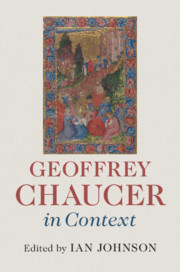Book contents
- Geoffrey Chaucer in Context
- Geoffrey Chaucer in Context
- Copyright page
- Contents
- Illustrations
- Contributors
- Abbreviations
- Introduction
- Part I Chaucer as Context
- Part II Books, Discourse and Traditions
- Part III Humans, the World and Beyond
- Part IV Culture, Learning and Disciplines
- Part V Political and Social Contexts
- Chapter 34 Dissent and Orthodoxy
- Chapter 35 The Church, Religion and Culture
- Chapter 36 England at Home and Abroad
- Chapter 37 Chaucer’s Borders
- Chapter 38 Rank and Social Orders
- Chapter 39 Chivalry
- Chapter 40 Chaucer and the Polity
- Chapter 41 The Economy
- Chapter 42 Towns, Villages and the Land
- Chapter 43 London’s Chaucer
- Chapter 44 Everyday Life
- Chapter 45 Household and Home
- Chapter 46 Marriage
- Chapter 47 Dress
- Part VI Chaucer Traditions
- Further Reading
- Index
Chapter 34 - Dissent and Orthodoxy
from Part V - Political and Social Contexts
Published online by Cambridge University Press: 24 June 2019
- Geoffrey Chaucer in Context
- Geoffrey Chaucer in Context
- Copyright page
- Contents
- Illustrations
- Contributors
- Abbreviations
- Introduction
- Part I Chaucer as Context
- Part II Books, Discourse and Traditions
- Part III Humans, the World and Beyond
- Part IV Culture, Learning and Disciplines
- Part V Political and Social Contexts
- Chapter 34 Dissent and Orthodoxy
- Chapter 35 The Church, Religion and Culture
- Chapter 36 England at Home and Abroad
- Chapter 37 Chaucer’s Borders
- Chapter 38 Rank and Social Orders
- Chapter 39 Chivalry
- Chapter 40 Chaucer and the Polity
- Chapter 41 The Economy
- Chapter 42 Towns, Villages and the Land
- Chapter 43 London’s Chaucer
- Chapter 44 Everyday Life
- Chapter 45 Household and Home
- Chapter 46 Marriage
- Chapter 47 Dress
- Part VI Chaucer Traditions
- Further Reading
- Index
Summary
What is ‘heresy’? One answer would be, ‘that which orthodoxy condemns as such’; though we may also wish to consider when conscious dissent invites such a condemnation. The main ‘heresy’ in late medieval England was that usually termed Lollardy, understood to be inspired by the radical theological thought of John Wyclif (1328-1384), which among other things emphasised the overwhelmingly importance of Scripture, and of lay access to Scripture, through vernacular translation. Orthodox repression of heresy began in the late fourteenth century and developed in various ways in the fifteenth. There are small traces of these much wider battles in Chaucer’s oeuvre, but it would be very hard to say quite how he saw them. We might instead see the fluidity of attitude toward aspects of religion in Chaucer as a sign of his times. ‘Dissent’ can encompass more than that which is solidly decried as heresy, and ‘orthodoxy’ can turn out to be more than one mode of religious thought and expression.
- Type
- Chapter
- Information
- Geoffrey Chaucer in Context , pp. 295 - 300Publisher: Cambridge University PressPrint publication year: 2019

